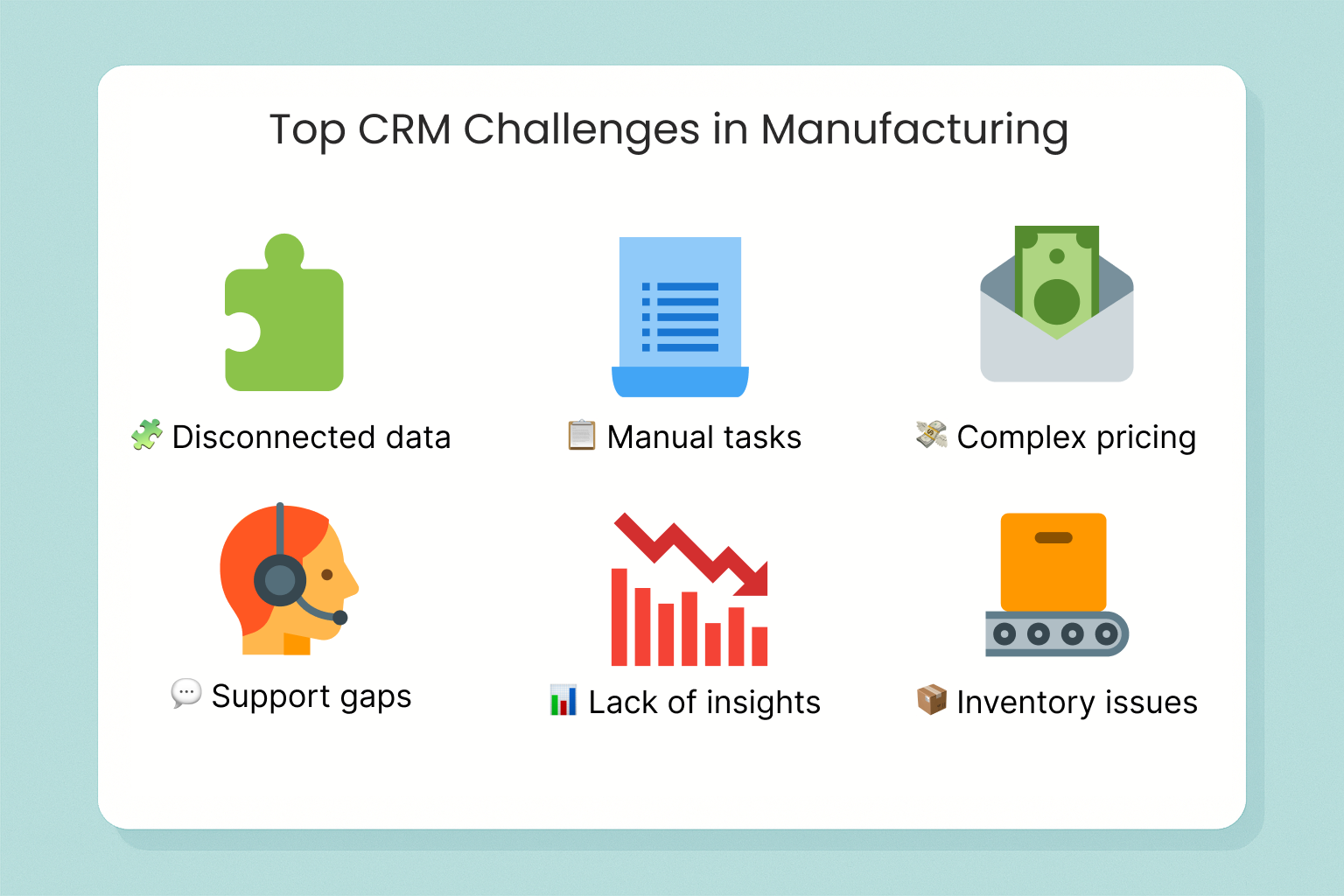CRM Challenges in Manufacturing: How Dynamics Solves Them

Manufacturing organisations face unique challenges when managing customer relations. For years, many manufacturers have relied on spreadsheets, email and legacy systems to track orders, support requests and product lifecycles. These systems are often fragmented. Sales, support, logistics and production teams end up working in silos. Customer information is stored in multiple databases and spreadsheets, making it difficult to obtain a unified view of the customer journey.
In recent years, manufacturers have realised that these challenges are affecting more than operations. They impact revenue, customer satisfaction and long-term growth. With changing customer expectations, complex supply chains and global competition, having a strong and modern CRM is now a necessity.
Microsoft Dynamics 365 offers a tailored solution. It goes beyond basic contact and opportunity tracking. It helps manufacturers integrate processes, collaborate across departments and deliver exceptional customer service. Here is how Dynamics helps resolve the most pressing CRM challenges in manufacturing.

Disconnected Data and Limited Visibility
A common issue in manufacturing is that data is spread across multiple systems. Sales has pricing and quotes. Production tracks work orders and inventory levels. Support teams log service cases. Without a central system, teams struggle to collaborate, and decisions are made without a complete understanding of the context.
Dynamics solves this by providing a single platform where data from sales, production and service all come together. The platform offers a unified view of the customer. Salespeople can view order history and support tickets in real-time. Support teams can review production schedules before committing to delivery dates. This shared visibility helps reduce miscommunication and ensure alignment across the business.
Manual Processes and Repetitive Tasks
In many manufacturing environments, workers spend hours on routine tasks. Follow-up emails, order confirmations, case updates, and report distribution are often repetitive and clerical tasks. These tasks take time away from customer interaction or strategic work.
Dynamics includes automation tools that remove manual effort. Workflows can automatically update fields, alert teams or schedule follow-ups based on customer actions. Order processes can trigger inventory updates once sales orders are confirmed and processed. Automated case routing ensures that the right support agent is assigned immediately. This saves time and reduces the risk of human error.
Complex Quoting and Pricing Requirements
Manufacturers often deal with custom configurations and volume pricing, which makes quoting a complex process. Traditional CRMs may struggle to support these pricing models or need extensive custom code. This can lead to mistakes that result in lost time and money.
Dynamics offers flexible product catalogues and pricing tools built for manufacturing. It supports multi-level price lists, discount structures and bundled products. Quotations can include manufacturing variables such as build time, components, and logistics costs. The platform ensures accurate and consistent pricing every time. Sales teams can generate quotes more quickly and with greater confidence.
Inaccurate Forecasting and Inventory Shortages
Many manufacturers rely on historical orders or basic spreadsheets to forecast demand. This method often fails to account for incoming quotes, changing lead times or customer urgency. The result can be inventory shortages or excess stock, leading to disruption and wasted capital.
Dynamics integrates CRM data with inventory and production planning modules. When a sales opportunity is tagged as high probability, the system flags this to production and procurement. Forecasting is more dynamic and reliable because opportunity stages, expected close dates and volume information feed directly into planning. This prevents stockouts and helps optimise inventory levels.
Poor After Sales Support and Warranty Management
Customer support is crucial in manufacturing, particularly for products under warranty or those requiring maintenance. Tracking warranty periods, service contracts and customer support history becomes complex when data is stored in separate systems.
Dynamics brings service and warranty management into the same platform used for sales and production. Customer support agents can view warranty status alongside purchase history and configuration details. Service scheduling, resource routing and case tracking are all handled within a single interface. Customers get faster responses and accurate service planning.
Customer Segmentation and Targeting
Manufacturers may sell to many segments, including OEMs, distributors, end users or government agencies. Each has different needs and buying cycles. Treating them all the same reduces campaign effectiveness and makes customer engagement generic.
Dynamics allows companies to define customer segments and buyer personas using CRM data. Sales and marketing teams can create targeted campaigns based on criteria such as industry, purchase history, or service needs. Automated workflows can be triggered when customers reach specific milestones, such as contract renewal or exceeding a certain order volume. This results in more meaningful interactions and better conversion rates.
Limited Analytics and Insight
Without actionable insight, companies struggle to understand performance. Questions like which products generate the most service calls or which sales reps consistently exceed targets are hard to answer. Teams lack data at their fingertips.
Dynamics includes built-in analytics and dashboards through Power BI integration. Users can view pipeline health, product performance, customer satisfaction, and lead time trends in real-time. Management can drill into data by region, product line or customer segment. Insights are visual and shareable via secure dashboards, which enable fast and informed decisions.
Poor Collaboration Across Teams
Manufacturing success depends on collaboration between teams. Sales must work with engineering on custom orders. Support needs production insight for service cases. Procurement needs to know the upcoming demand from sales pipelines.
Dynamics enables collaboration through shared views, integrated notes and activity feeds. It connects seamlessly with Microsoft Teams, ensuring everyone can work together in context. A support case can be escalated to engineering via Teams chat. Procurement data can enrich sales quotes within the same workspace. This removes silos and fosters seamless teamwork.

Regulatory Requirements and Compliance
Manufacturers often face industry regulations, such as ISO standards, product traceability, and environmental reporting. Fragmented data storage makes it hard to produce audit trails or compliance reports. Manual logging increases the risk of non-compliance.
Dynamics provides audit logs, field tracking and data governance tools. It helps organisations monitor changes to orders, pricing, service cases and product configurations. Reports can be generated quickly. Approvals and workflows can be enforced across teams to ensure regulatory steps are not bypassed. This supports compliance without adding extra manual burden.
Implementation and Training
Adopting a new CRM often stalls due to its complexity and resistance to change. Implementation can take months, and the return on investment is delayed. If user adoption is low, the system becomes underutilised and benefits are lost.
Microsoft Dynamics 365 takes a phased approach. Out-of-the-box templates for manufacturing help companies get started quickly and efficiently. Teams can launch in sales or support before expanding to production or planning. The platform is easy to customise without coding. Mobile apps allow teams in the field to access CRM anywhere. Microsoft also provides community support, learning portals, and partner-led training to ensure teams adopt with confidence.
Business Transformation and Growth
When these challenges are addressed, manufacturers can operate smarter. Sales become more targeted and efficient. Production aligns closely to real demand. Inventory levels are optimised. Support becomes proactive and data-driven.
All this drives better customer experience, more substantial margins and reduced waste. Dynamics helps organisations scale confidently, enter new markets or adapt their product lines efficiently.
Final Thought
The manufacturing sector is evolving fast. Those who continue with spreadsheets and disjointed systems risk falling behind. Microsoft Dynamics 365 provides a modern CRM that bridges the gap between sales production and support. It brings visibility, data-driven decisions, and smooth collaboration to the heart of operations.
At ARP Ideas, we specialise in helping manufacturing companies adopt Dynamics. We guide everything from strategy design and implementation to user training and analytics. If you would like to discuss your CRM strategy or learn how Dynamics can transform your organisation, we are here to help.

